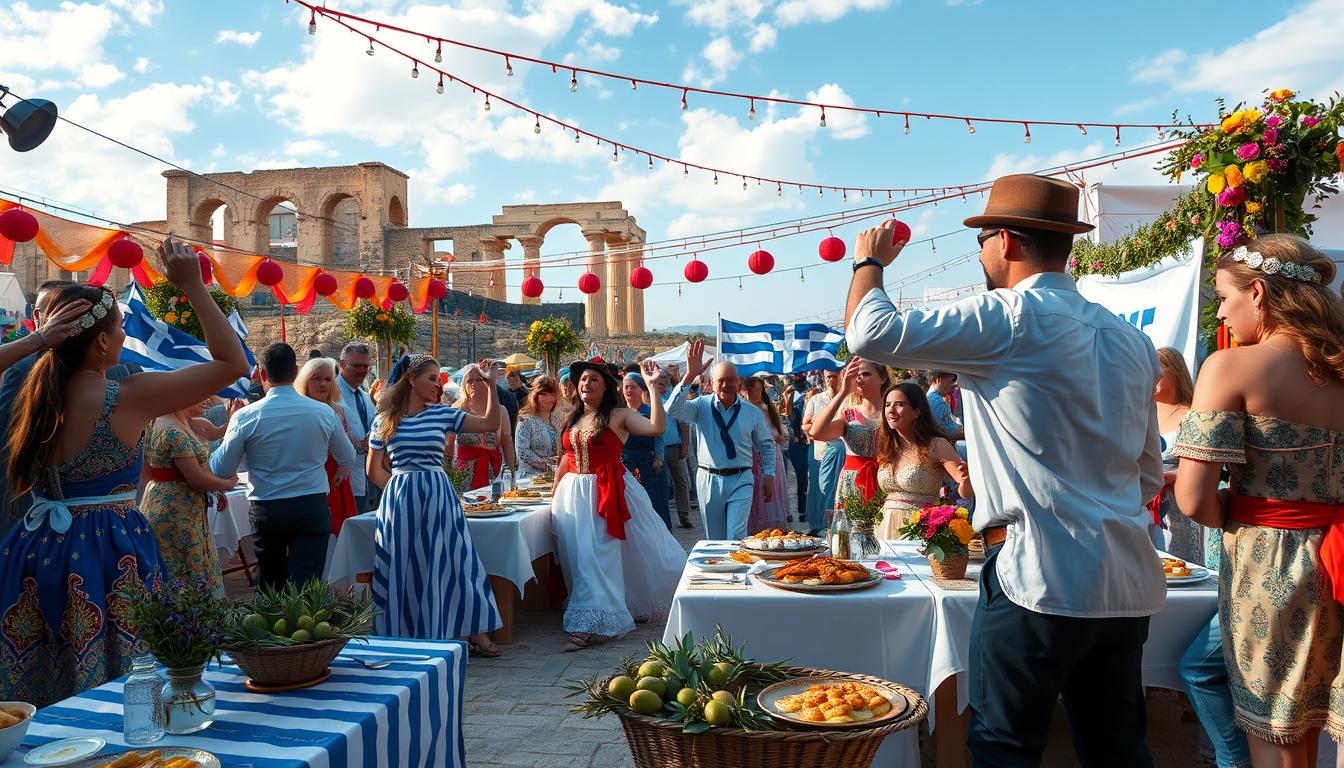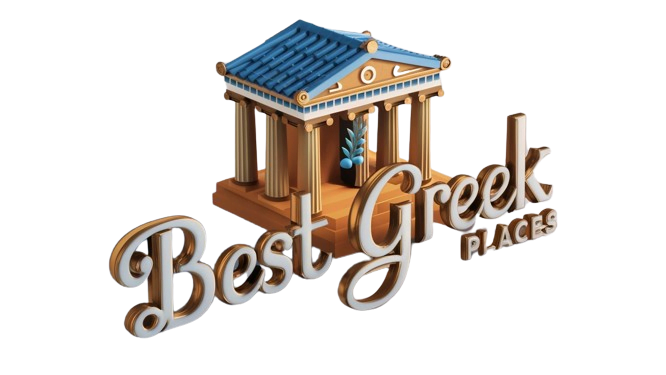“In every community, there is work to be done. In every nation, there are wounds to heal. In every heart, there is the power to do it.” – Marianne Williamson
Greek culture is a vibrant mix of history, religion, and tradition. To understand Greek traditions, you must explore the *festivals you should attend*. These festivals are key to Greek life, filled with joy and deep cultural meaning. They offer a peek into Greek history, showing customs and rituals that have lasted for centuries.
Easter (Pascha) is the most important religious event in Greece, filled with reverence and joy. It’s marked by processions and family gatherings during Holy Week1. Carnival (Apokries) is known for its colorful costumes and parades, leading up to Lent2. The Feast of the Assumption of the Virgin Mary, on August 15th, combines religious devotion with community feasting1. The Festival of Saint George is tied to springtime and agricultural traditions1. Each festival reflects Greek values, making them key cultural events for locals and visitors alike.
Exploring these traditions reveals more than just celebrations. It shows deep connections to the past and strong community bonds that still thrive in modern Greece.
Key Takeaways
- Greek festivals provide deep insights into the culture and traditions of Greece.
- Easter is the most significant religious festival in Greece.
- Carnival in Greece, known as Apokries, is famous for its elaborate celebrations.
- The Feast of the Assumption is a vital event blending religious and communal festivities.
- Festivals showcase the enduring customs that connect modern Greeks to their heritage.
Introduction to Greek Traditions

Greek traditions are a big part of society, mixing beliefs, practices, and community events. Festivals are key, strengthening family bonds and cultural identity. They celebrate shared values and honor the nation’s history, showing the cultural significance of festivals everywhere.
Importance of Festivals in Greek Culture
Festivals in Greece are more than just events. They bring people together, creating a sense of belonging and unity. Through Greek holiday customs, people enjoy lively celebrations that showcase Greek festival traditions. These traditions deeply connect people to their heritage and local customs.
Overview of Greek History and Traditions
Greek customs have evolved over time, influenced by ancient rituals and Christian practices. Festivals capture elements from different eras, shaping modern Greek society. Local traditions keep stories, songs, and dances alive, reflecting the cultural significance of festivals and the people’s spirit.
Major Greek Festivals Overview

Greece’s culture shines through its many festivals. The country celebrates various events, appealing to both locals and tourists. These include religious festivals, cultural events, and music and dance festivals. Each event offers a chance to dive into Greece’s rich traditions and customs.
Religious Celebrations
Religious festivals are key in Greek society, often tied to Orthodox Christian traditions. For example, the Feast of Agios Vassilis on January 1st welcomes the New Year with church services and a special cake. The cake has a hidden coin, bringing good luck to whoever finds it3.
Easter Sunday is a major event for the Greek Orthodox Church. It includes Holy Week services and traditional meals like magiritsa3. The Feast of Saint George on April 23rd is also celebrated nationwide, especially in Arachova and Skiathos3.
Cultural Events
Cultural events showcase Greece’s artistic heritage and community spirit. The Epidaurus Festival honors ancient Greek theatre with drama performances every Friday and Saturday night in summer4. The Thessaloniki International Film Festival also draws film lovers worldwide with its diverse events3.
These events highlight the essence of Greek life. They show Greece’s dedication to preserving its cultural identity.
Music and Dance Festivals
Music and dance festivals bring joy and celebration. The Carnival of Corfu, from February to March, features colorful processions that capture the festive spirit3. The Athens Epidaurus Festival combines music and theatre, offering magical experiences in famous venues like the Herodes Atticus Theatre3.
These festivals entertain and unite communities through shared artistic experiences.
Easter Celebrations in Greece

Greek Easter, or Pascha, is a big deal in Greece. It’s a mix of religious traditions and cultural customs. These celebrations are a big part of Greek life.
The Holy Week Observances
The Holy Week starts with Palm Sunday and daily church services. Fasting begins on Clean Monday. This leads up to the important days that follow.
Good Friday has the Epitaphios procession. It’s a ritual where a decorated bier is carried through the streets. It shows sorrow and reflection.
Holy Saturday ends with a midnight service. People gather to celebrate the Resurrection. This is marked by fireworks and the arrival of the Holy Fire in Athens5.
Traditional Easter Foods
Food plays a big role in Greek Easter. Magiritsa soup is served after midnight. It’s made from lamb’s offal.
The smell of roasted lamb fills the air. Red-dyed eggs are also a big part of Easter. They’re cracked in a game called ‘tsougrisma’ during gatherings65.
Unique Customs and Rituals
Greek Easter has many unique customs. In Corfu, people throw earthenware pots from balconies. This makes a loud noise.
Chios has a “Rocketwar” tradition. Parishes launch fireworks at each other. It shows community spirit and friendly rivalry5.
Carnival Season: A Festive Extravaganza

The Greek carnival, or Apokries, is a lively celebration before Lent. It has deep roots in ancient festivals, making it colorful and diverse. Communities in Greece enjoy music, dance, and themed events during this time.
Origin of the Greek Carnival
The Greek carnival’s history goes back to ancient times. It mixes pagan celebrations with Christian traditions. Today, it shows Greece’s culture through its lively festivities7.
Core Events and Activities
Events during carnival include masquerades, parades, and feasts. These are filled with joy and community spirit. Street performances and dances showcase local customs.
A key tradition is burning the Carnival King. It’s a colorful event to welcome spring and say goodbye to winter. People enjoy ‘lagana’ bread and ‘halvas’, adding to the festive fun8.
Popular Locations to Experience Carnival
Patras and Athens are top spots for carnival celebrations. Parades attract both locals and tourists. Each place has its own twist, showing off local culture and traditions.
The Carnival in Thassos is great for families. It’s a place where everyone can join in and make lasting memories89.
The Feast of St. George

The Feast of St. George is a big deal in Greek culture, celebrated on April 23rd. It honors Saint George, the Great Martyr. This event mixes faith and community, showing off Greek traditions.
Historical Significance of St. George
Saint George is seen as the protector of soldiers. He was born between 275 and 285 A.C. and died in 303 A.C. People from many Christian groups celebrate his feast day10.
Typical Celebrations and Customs
The St. George celebration, or “Panigyraki,” is a three-day event. It includes religious events, local shows, and community activities. In Arachova, thousands join in with a procession and sports11.
In Skiathos, horse races are a big part of the fun10. Family meetings and blessings of crops are common. These traditions show the connection to heritage and land12.
Foods Associated with the Feast
Food is key at the Feast of St. George. It brings people together and celebrates culture. In Crete, locals share milk and dairy products10.
The food is more than just food. It’s about sharing and community. It connects old traditions with today’s celebrations.
Athens Festival: A Cultural Hub

The Athens Festival is a key event in Greek culture, drawing people from all over. It has been running for over 69 years, offering a mix of theater, music, and dance. The 2024 festival will have 93 shows over 85 days, from June 1 to October 613.
It will feature around 2,500 performers, adding to the rich cultural scene of Greece13. The Ancient Theatre of Epidaurus and Odeon of Herodes Atticus are key venues. They add to the festival’s charm with their history.
Overview of the Festival’s History
The festival has grown a lot since it started. It now includes many genres while keeping traditional Greek culture at its heart. It celebrates ancient Greek theater and also brings in new, innovative works.
Notable Performances and Events
Each year, the festival welcomes famous artists like Sting and Yo-Yo Ma. It also features unique shows, like a new take on Stravinsky’s “The Rite of Spring”13. Kids can join workshops to learn about Ancient Greek myths13.
How to Attend the Athens Festival
People can plan their visits to see the festival’s shows at different venues. It’s a great chance to dive into the arts and feel Athens’ lively vibe. The Athens Festival is a key event for anyone wanting to explore Greece’s culture.
The Athens Festival has something for everyone, making it a top choice for festival lovers.
The Panigiri: A Community Celebration

A Panigiri is a key part of Greek culture. It’s a lively celebration that mixes religious observance with festive fun. These traditional feasts honor a patron saint, bringing people together and creating a sense of community.
They are held on special days like Saint Peter and Paul’s on June 29th and the Virgin Mary’s Dormition on August 15th in the Mani Peninsula14. Each village shows its unique spirit through these events. They offer a glimpse into the *Greek festival traditions* that have shaped over centuries.
What is a Panigiri?
A Panigiri is a communal gathering at a village’s church. It celebrates the name day of the patron saint15. People sing, dance, and share food, blending social and religious life in *experiential Greek festivals*.
Guests enjoy spit-roasted lamb, local dips, and fresh bread. These dishes are made together, showing the community spirit of Panigiria15.
Regional Variations in Celebrations
Every region in Greece adds its own twist to Panigiria. Places like Milea Rigklia and Exoxhori shine in summer celebrations14. These differences show in the food, customs, and music.
Local musicians play traditional instruments like bouzoukia and lyra. This adds to the cultural richness of the event14.
The Role of Music and Dancing
Music and dancing are crucial in Panigiri festivities. Greek folk songs fill the air, making everyone want to dance15. Traditional dances celebrate shared heritage and cultural identity, embodying *experiential Greek festivals*.
The lively atmosphere brings generations together. It creates stories and memories that last14.
The Revival of Ancient Olympian Traditions

The ancient Olympic traditions are a big part of Greek culture. They celebrate physical strength and the spirit of competition. The first Olympic Games were in 776 BCE in Olympia, Greece16.
These games honored Zeus and were key to Greek life. They were held around major sports events17.
Origin and History of the Games
The Olympics were held every four years until 393 CE17. They were a big cultural event, drawing athletes from all over. The first winner was Coroebus of Elis in 776 BCE17.
Events included running, wrestling, and chariot racing. Athletes competed nude to show off their strength and beauty18.
Modern Celebrations of the Olympic Spirit
The first modern Olympics were in Athens in 189618. They had 280 athletes from 12 countries. Today, the Olympics are held every two years, with Summer and Winter games.
They bring together athletes and fans from around the world. The Olympics now celebrate teamwork and art, showing how society has changed.
Importance of the Olympics in Greek Culture
The Olympics make Greece proud. They unite people in a shared heritage that’s over 2,000 years old16. The Olympics keep alive the spirit of competition, peace, and community.
The Day of Ohi

The Day of Ohi is a big deal in Greek culture. It’s celebrated on October 28th every year. It remembers when Greek Prime Minister Ioannis Metaxas said “Ohi” to Italy’s ultimatum in 1940. This led Greece into World War II.
This day is all about courage and unity. It reminds us of the bravery shown during hard times. It’s a key part of being Greek today, bringing people together for celebrations.
Historical Background of Ohi Day
On October 28, 1940, Italy threatened Greece. They wanted to take over key areas. But Prime Minister Metaxas said “Ohi,” meaning no.
This bold move made Greece proud and started the Greco-Italian War. The war lasted from November 1940 to April 1941. Today, Ohi Day is a national holiday in Greece and is celebrated worldwide192021.
Celebratory Activities
Ohi Day celebrations are full of life and patriotism. In cities like Athens and Thessaloniki, big parades happen. Thousands watch, showing their national pride.
School kids march in traditional or military clothes. This teaches them about Ohi Day’s importance. There are also wreath-laying ceremonies at war memorials. Cultural events and speeches add to the day’s spirit, highlighting unity and resilience2021.
Impact on National Identity
Ohi Day deeply affects Greek national identity. It reminds Greeks of their bravery against invaders. It makes people feel proud of their heritage.
Cafes and restaurants are lively on this day. People gather to celebrate, showing the importance of Greek holiday customs today192021.
The Festival of the Virgin Mary
The Festival of the Virgin Mary is a big deal in Greece, happening every August 15th. It celebrates the Virgin Mary’s journey from life to heaven. People from all over come to join in, enjoying cultural events and deepening their faith.
Cultural Significance of the Virgin Mary
The Virgin Mary is very important in Greek culture, representing love and care. During the festival, her importance is shown through pilgrimages and candlelight walks. On Tinos, thousands of people visit the Church of Panagia Evangelistria, crawling as a sign of devotion22.
This festival brings together tradition and spirituality. It shows how faith and culture are closely tied, creating a sense of unity.
Key Events During the Festival
The festival is filled with prayers, hymns, and processions. These events fill the air with a spiritual vibe. In Kefalonia, there are horse races called “Robolimni,” celebrating the local community22.
Decorated boats in coastal processions symbolize the Virgin Mary’s journey. At Agiasos Church in Lesvos, people walk long distances, showing their faith and dedication23.
Where to Experience the Festival
The festival is celebrated in many places, each with its own charm. Tinos is famous for its large gatherings. Kefalonia has its own legends, like snakes with black crosses, seen as divine signs24.
Local churches and monasteries are the heart of these celebrations. They are where faith and culture meet, making the festival unforgettable.
Local Festivals Across the Islands
Greece’s islands are home to stunning landscapes and vibrant festivals. Each island has its own traditions, bringing people together in colorful celebrations. These experiential Greek festivals offer a chance to explore local customs and tastes.
Island-Specific Traditions
Every Greek island has its own unique traditions. For example, Lesvos celebrates the Assumption of Mary on August 15th, drawing many worshippers23. During Easter, locals boil red-dyed eggs and decorate Christ’s grave, showing unity and pride23.
The harvest festival in November features local foods and crafts, along with traditional music. It highlights the island’s rich agricultural history23.
How Local Communities Celebrate
Local celebrations bring people together, strengthening community bonds. Events like Carnival, or Apokreas, fill the streets with color and music25. These gatherings boost cultural pride and social connections, uniting islanders.
Popular Islands for Festival Enthusiasts
Islands like Santorini, Crete, and Lesvos are perfect for festival lovers. They host many experiential Greek festivals in the summer, including the Athens Epidaurus Festival26. Visitors can enjoy traditional dances, music, and food, diving into the local way of life.
The Arts and Literature Festival
The Arts and Literature Festival in Greece celebrates the country’s rich artistic and literary history. It brings together fans, creators, and performers. This event highlights the importance of Greek cultural events.
It showcases various arts like theater, poetry, visual arts, and music. This makes the festival a vibrant celebration of creativity.
Overview of Arts and Literature in Greece
Greece has a long history in the arts, blending ancient traditions with modern styles. Its artistic scene is diverse, from classic literature to modern performances. The country has ten entries on UNESCO’s list of intangible cultural heritage.
Many festivals celebrate dance, music, and folklore. These events add to Greece’s cultural identity27.
Events Celebrated During the Festival
The festival includes events in historic venues like the Epidaurus Ancient Theatre. These events showcase performances and offer workshops for new artists. In 2015, Athens hosted several arts and literature festivals, featuring a wide range of talents28.
Influence of the Festival on the Arts
This festival has a big impact on the arts community. It connects artists, audiences, and cultural institutions. Attendees often start new collaborations, enriching the artistic scene.
As these festivals grow, they stay true to their roots while embracing new ideas. This shows the lasting power of Greek creativity.
Gastronomic Festivals: A Taste of Greece
Greece is famous for its lively food scene. The country’s food festivals highlight this richness. These events bring together local dishes and seasonal tastes, uniting communities through food.
From olives to sweet pastries, these festivals show the variety of Greek traditions. They offer a glimpse into the country’s culinary diversity.
Prominent Food Festivals in Greece
The Aegina Fistiki Fest and Nafplio’s Olive Festival are top events. The Aegina Fistiki Fest celebrates Aegina’s prized pistachios. Visitors can try dishes made with these nuts and see local crafts.
Nafplio’s Olive Festival honors the olive harvest. It showcases olives and olive oil in various products and dishes29. This festival lets people taste different regional flavors and learn about olive farming.
Signature Dishes and Local Specialties
At these festivals, you can try traditional dishes like pasticcio and meze. The Kalamata International Dance Festival combines food and dance29. You’ll also find treats like loukoumades and koluri at the Patras Carnival, a big hit with thousands of visitors30.
Each dish has its own story, reflecting the region’s history and traditions. Food is a big part of Greek culture.
The Role of Culinary Traditions
Culinary traditions are key in Greek culture. Food festivals in Greece bring people together, creating a sense of community. They celebrate the unique culinary heritage of each region.
Events like the Apokries Carnival in January and February highlight the importance of food in celebrations30. These festivals help keep local ingredients and recipes alive, connecting generations.
Conclusion: Experiencing Greek Culture Through Festivals
Exploring Greek culture through festivals is a unique way to learn about Greek traditions. Each festival, like Carnival and Easter, shows the heart of Greek identity. These events are more than just gatherings; they are filled with history, community, and a love for heritage.
By participating in these festivals, you can dive into the rich cultural world of Greece. You’ll see customs and rituals that have been passed down for generations.
Embracing Greek Traditions
For those interested in Greek festivals, each event has its own special traditions. Athens, for example, has over 120 festival days a year, attracting both locals and tourists31. By joining in these traditions, you can connect with Greece’s past and celebrate its lively culture today.
Planning Your Visit to a Greek Festival
When you plan to attend a Greek festival, remember to respect local customs and timing. Many festivals are tied to the seasons or religious holidays, making them lively and meaningful31. By trying local foods or dances, you’ll join a community from all walks of life. This way, you’ll not only have fun but also share in a cultural heritage that lasts forever.
Final Thoughts on the Richness of Greek Heritage
In summary, exploring Greek festivals shows how vital it is to keep these traditions alive. These events connect the past with the present, ensuring our cultural stories are told for years to come. By participating in these celebrations, you become part of a global community that values diverse cultures32.
FAQ
What are some popular Greek festivals to attend?
How do Greek festivals reflect local culture?
What significance does Greek Easter hold in Greece?
What activities are associated with the Greek Carnival?
How does the Athens Festival contribute to Greek culture?
What is a Panigiri?
How are the ancient Olympics celebrated today?
What is Ohi Day and why is it celebrated?
What are the key events during the Festival of the Virgin Mary?
How do local festivals on the islands vary?
What is the focus of the Arts and Literature Festival in Greece?
Why are gastronomic festivals significant in Greece?
Source Links
- Traditional Greek Festivals you don’t want to miss out – Experiences in Athens, Greece
- Traditions in Greece & the islands | Greeka
- Festivals and Events in Greece & the Islands | Greeka
- Festivals in Greece | Intrepid Travel
- Easter in Greece: Traditions and Best Destinations
- Easter in Greece
- Carnival | Definition, Festival, Traditions, Countries, & Facts | Britannica
- Carnival in Thassos – Guide by a Local
- Carnival
- Agios Georgios Feast in Greece
- St George Celebration – Alpen House – Ξενοδοχεία στην Αράχωβα – Διαμονή στην Αράχωβα
- «St. George in Greek Religious Tradition and Popular Religiosity», στον τόμο Gordana Blagojević (επιμ.), The Feast of Saint George: Different cultural Contexts and Traditions. Belgrade 2018, (έκδ. Serbian Ethnological and Anthropological Society –
- Athens Epidaurus Festival 2024 | Happy.Rentals
- Traditional Festivals of Mani: Celebrating Culture and Heritage
- Traditional Festivals of Greece: Panagiri
- The Ancient Olympics: Bridging past and present: View as single page
- Ancient Olympic Games | Greece, History, Events, Running, & Facts | Britannica
- The Olympic Games: Locations, Facts, Ancient & Modern | HISTORY
- Greek Ohi (Oxi) Day – Crete Tip
- What is Ohi Day (Oxi Day) in Greece? – Sithonia – Visit Sithonia Greece
- Oxi Day in Greece: A Day of Bravery, Pride, and Celebration | Athens Walking Tours
- Celebrating August 15th: A Greek Panagia Festival of Joy and Devotion | Athens Insiders – Private Tours in Greece
- Discover popular Greek religious festivals I Real Lesvos
- Tailor Made Holidays to Greece, Cyprus, Azores & more | Sunvil.co.uk
- Greece’s colourful festivals | Greece Property Guides
- The top 5 festivals in Greece
- Greek music and festivals recognized as UNESCO’s Intangible Cultural Heritage – Greek News Agenda
- Greece’s 10 most spectacular festivals – Wanderlust
- Greek food festivals and celebrations – Vivato Greece
- IMPORTANT EVENTS AND HOLIDAYS IN GREECE
- FESTIVALS IN ANCIENT GREECE | Facts and Details
- Culture of Greece

















